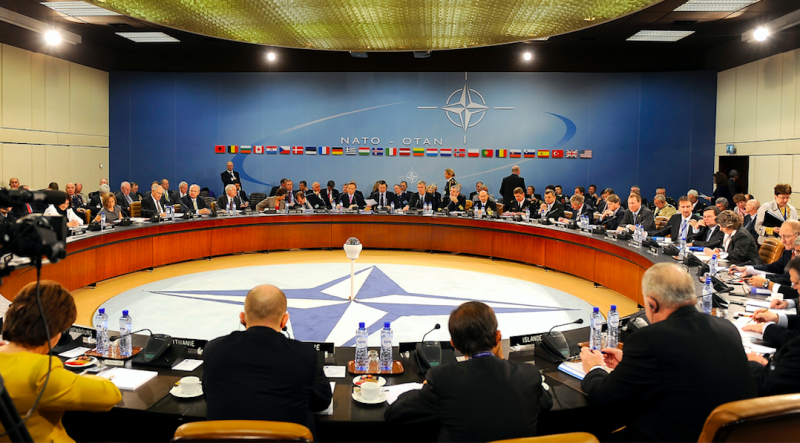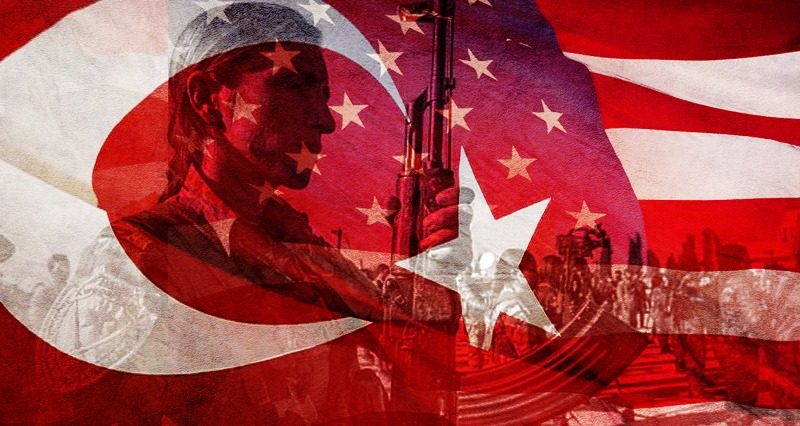The US sees the tension between Turkey and Russia in Syria as an opportunity to pull Ankara back into its orbit of influence. It is significant that although the Americans had earlier refused to support Turkey in the fight against PKK terrorists in Syria, they seem to have suddenly remembered their obligations as a NATO ally.
US Secretary of State Mike Pompeo for the second time expressed his condolences over the death of Turkish soldiers in Syria, stressing that “ongoing assaults by the Assad regime and Russia must stop.”
My condolences to the families of the soldiers killed in yesterday's attack in Idlib. The ongoing assaults by the Assad regime and Russia must stop. I've sent Jim Jeffrey to Ankara to coordinate steps to respond to this destabilizing attack. We stand by our NATO Ally #Turkey.
— Secretary Pompeo (@SecPompeo) February 11, 2020
While in Turkey, US Special Envoy for Syria Jim Jeffrey called the Turkish soldiers killed in Idlib “martyrs”, adding that they are being threatened by Russia and Syria.
In the wake of the HalkBank case, the US Treasury Department lifted sanctions from the Turkish ministers of defense, interior and energy.
The Turkish Minister of Defense Hulusi Akar said that, in order for the Assad regime to stop attacks in Idlib, NATO, Europe and the whole world must provide serious and tangible support to Ankara. However, can Turkey rely on the US?

Wikipedia
Aiding terrorists
The Russian embassy in Turkey recently put out a reminder that the United States continues to support Kurdish separatists, which has struck a chord on the Turkish Internet. While some were critical because of the source, no one can deny that the information is accurate.
In accordance with the 2020 military budget, the United States intends to allocate $ 300 million to the Syrian democratic forces (an offshoot of the terrorist YPG organization). The request for 2021 lists 200 million, but it is very likely that, thanks to the efforts of the Kurdish lobby, the number will grow. Despite the fact that Washington calls Ankara allies, the United States continues to allocate money to Kurdish terrorists.
In 2020 the United States intends to allocate $ 173 million for training and equipping its allies in Syria ($59 million more than in 2019), and also to increase militants’ salaries up to $48 million ($18 million more than last year).
Along with statements of support for Turkey in Idlib, on November 5, the US claimed it “has halted a secretive military intelligence cooperation program with Turkey that for years helped Ankara target Kurdish PKK militants”, Reuters reported.
The US’ decision complicates the conduct of hostilities against PKK terrorists who regularly carry out attacks against Turkish citizens. US neocons openly support PKK. The other day, a resident scholar at the American Enterprise Institute, Michael Rubin, called on US leadership to remove the Kurdistan Workers’ Party from the list of terrorist organizations.
Trump’s pro-Israel and anti-Iranian policies attest to the significant influence that neocons have on American politics in the Middle East. There is no reason to believe that forces which hate Turkey will suddenly decide to change their attitude.
https://uwidata.com/7039-the-empire-strikes-back-netanyahu-trump-and-the-neocons/
A hypocritical game
On the one hand, the United States encourages Turkey’s military operations in Syria and pits Turkey against Russia, official Damascus and Tehran. On the other, the current US Administration is doing everything to impede Ankara’s actions against PKK and YPD, providing continued support to Kurdish terrorists.
Despite all Turkish objections, the US continues to cooperate with the so-called Syrian democratic forces
Our U.S. presence in NE Syria supports the #SDF to defeat ISIS remnants. In coordination with our partners we regularly reposition forces to increase our effectiveness in the #defeatDaesh mission. @OIRSpox
— Combined Special Ops Joint Task Force-Levant (@SOJTF_LEVANT) February 11, 2020
Washington hopes that Ankara will get stuck in the Idlib war, which would help provide respite to pro-American Kurdish militants in the east of the country. They see this as a chance to strengthen their positions in order to eventually carry out strikes on Turkish territory.
Last week negotiations began on an alliance of the Democratic Union Party (PYD) and the Kurdish opposition forces more favorable towards Turkey. The Kurdish National Council (KNC) has agreed to reopen its offices in northeastern Syria as a result of pressure from Washington.
The United States hopes to unite the two Kurdish groups while retaining the real levers of power with proven personnel from PYD. Under the guise of “Kurdish unity”, PKK terrorists will be given new cover. At the same time, the United States will try to seize Turkey’s leverage over the KNC.
As Al-Monitor wrote that “the Kurds could get fresh room to maneuver if a continued escalation in Idlib causes the Russian-Turkish partnership to collapse.”
The situation would allow Kurdish terrorists to take advantage of the situation and ask for support from Russia and the Syrian government without losing American help. Conversely, if Turkey and Russia come to agreement, Russia will have to provide Turkey with compensation for its losses in Idlib. Within Syria, such compensation will almost certainly be concessions on the Kurdish issue.
A victory for the PKK?
Kurdish separatists have already begun to take advantage of the confrontation between Russia and Turkey despite continuing to work with the Americans. Take note of the fact that even after an American patrol shot a Kurdish teenager near the city of Qamishli, there was no harsh criticism from the separatists. By taking advantage of the aggravation between Turkey and Syria, the Kurdish separatists are trying to recapture the territories in Afrin.
On February 14, the SAA, together with the PKK’s loyal Liberation Forces of Afrin, opened a new front northwest of Aleppo from Nubbol and Zahra. The Armenian lobby, which managed to pass a resolution condemning the “Armenian genocide” through the Syrian parliament a day earlier, also took advantage of the complication in relations.
The continuation of the Idlib crisis is contributing to the strengthening of Kurdish separatists and other anti-Turkish forces, who will not lose anything in the West, but will try to strengthen their positions in the East. However, if Moscow or Tehran (which is less likely) believes them, it will mean that they have been cruelly deceived. The Kurdish separatists ties to the US and Israel are strong, and by helping these “Kurds” Syria and Russia will only strengthen the most pro-US and unreliable element in the Syrian puzzle. Both Moscow and Ankara stand to lose as a result of the tensions.

















Leave a Reply